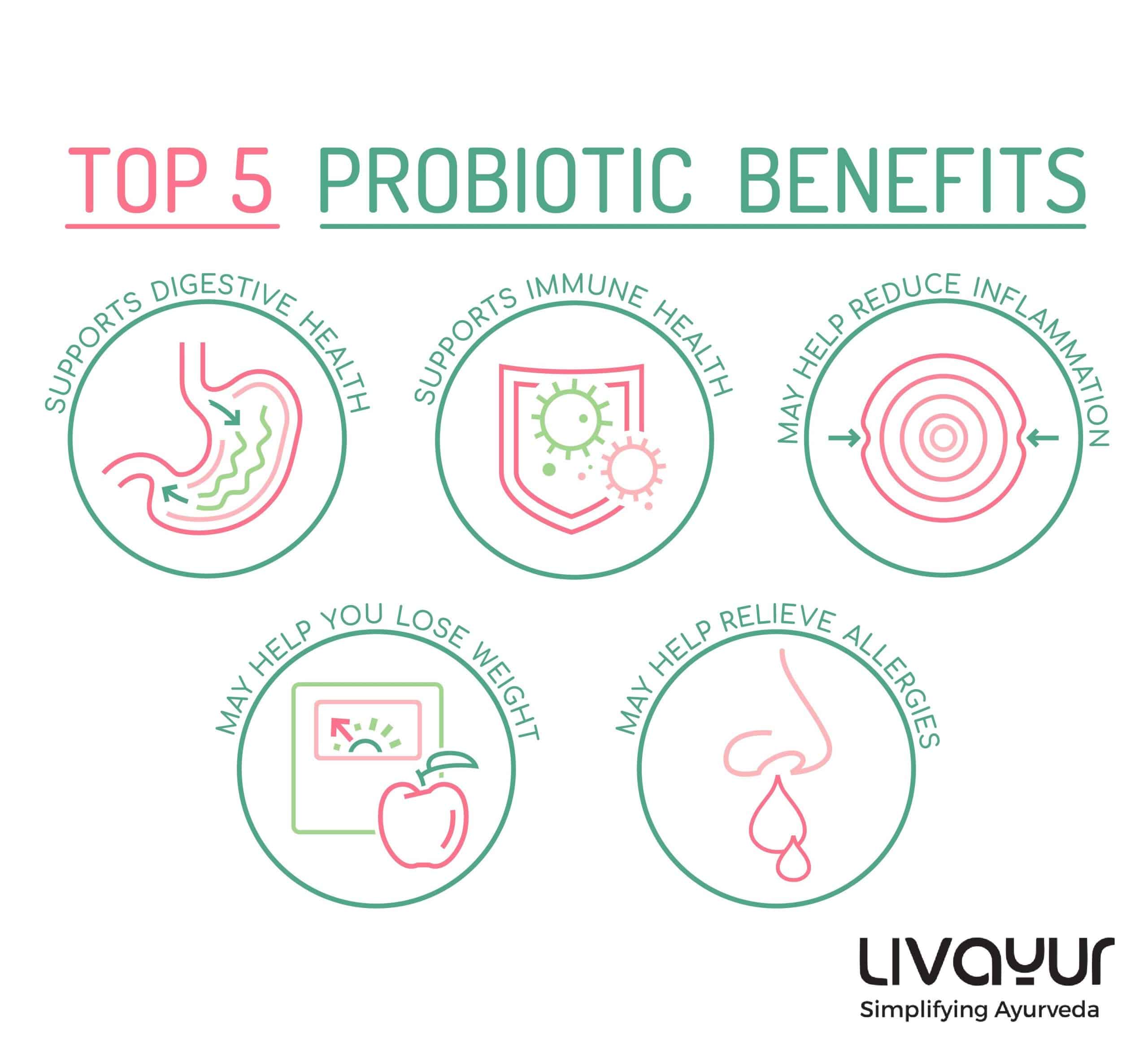
In Ayurveda, the delicate balance of the human body is crucial to achieving optimal health and well-being. Though a relatively recent addition to the modern wellness sphere, probiotics have been revered in Ayurvedic philosophy for their impact on digestive health and beyond. These living microorganisms have garnered increasing attention for their capacity to harmonize the body’s intricate systems. They offer digestive relief and many other remarkable advantages that extend to the physical, mental, and spiritual spaces. Rooted in the timeless wisdom of Ayurveda, this article explores the benefits of probiotics for your health.
What are probiotics?
Probiotics, integral to Ayurvedic pharmaceutics, resonate with the ancient tradition of fermentation preparations known as “asava-arishtas” and a selection of dietary concoctions termed “pathya kalpas.” These therapeutic preparations, steeped in the wisdom of Ayurveda, share remarkable similarities with modern probiotics and prebiotics in their potential health benefits.
Probiotics, by definition, are living microorganisms harnessed and incorporated into diverse products, ranging from foods to pharmaceuticals and dietary supplements. While the world of probiotics boasts various microbial candidates, the most frequently employed species include lactobacillus and bifidobacterium.
Nevertheless, yeast, like saccharomyces cerevisiae, and specific E. Coli and bacillus strains are also harnessed for their probiotic properties. Many of these probiotic strains, particularly lactobacillus species, have enjoyed a dual role throughout history. They have served as agents of food fermentation and potential bestowers of invaluable health benefits. [1]
Ten benefits of probiotics for your health
In Ayurveda, incorporating probiotics into one’s daily regimen is a profound practice with manifold benefits for overall health. Here are ten notable benefits of probiotics.
- Cleansing the channels of circulation (srotas)
Probiotics are crucial in purifying the body’s intricate channels of circulation, known as “srotas.” This cleansing action facilitates the proper delivery of “rasa,” the ultimate product of food digestion, to the body’s tissues, enhancing nourishment, strength, and complexion. [2]
- Preventing ageing
Ayurveda recognizes the role of probiotics in thwarting the signs of premature aging, helping individuals maintain youthful vitality and radiance. [2]
- Maintaining arterial flexibility
Probiotics contribute to the preservation of arterial flexibility, thereby supporting cardiovascular health and ensuring that arteries remain supple over time. [2]
- Abundance of friendly bacteria
Probiotics are a rich source of friendly bacteria, which are essential for the optimal functioning of the intestines and the entire body, fostering a harmonious internal environment. [2]
- Promoting homeostasis
Probiotics aid in achieving and preserving homeostasis, the state of equilibrium within the body, promoting overall balance and well-being. [2]
- Enhanced mineral absorption
Probiotics can facilitate the absorption of essential minerals, most notably calcium and iron, promoting robust bone health and preventing anemia. [2]
- Detoxification
By aiding the body in expelling toxins and harmful substances, probiotics play a crucial role in detoxifying the body, ensuring a purified and rejuvenated system. [2]
- Intestinal cleansing
Probiotics assist in thoroughly cleansing the intestines, purging accumulated waste materials, and promoting digestive health. [2]
- Relieving constipation
Including probiotics in one’s regimen can alleviate constipation, a common ailment that hampers the digestive process. [2]
- Restoring intestinal flora: Probiotics contribute to the replenishment of beneficial intestinal flora, ensuring a thriving ecosystem within the gut and fostering optimal digestion and immunity. [2]
Common probiotics to consider for your diet
When embracing probiotics as a fundamental diet component, Ayurveda highlights various traditional and readily accessible options. Two common probiotics, highly regarded in Ayurveda for their nourishing qualities and gut-friendly attributes, are yogurt and buttermilk. Let’s look at them in detail.
- Yogurt
Yogurt, or “dahi,” is a cornerstone of probiotic consumption. This cultured dairy product is a rich source of beneficial bacteria, primarily strains of lactobacillus and bifidobacterium, which contribute to a harmonious gut environment. Yogurt has cooling properties, making it an excellent choice for individuals with a predominant pitta constitution in Ayurveda.
Its consumption aids digestion and helps in maintaining a balanced gut microbiome. Moreover, yogurt is a versatile ingredient that can be enjoyed independently, mixed with fruits and honey, or incorporated into savory dishes and beverages. [2]
- Buttermilk
Known as “lassi,” buttermilk is another probiotic-rich beverage with a legacy deeply rooted in traditional Indian cuisine. You can prepare it by churning yogurt to separate butter and leaving the remaining liquid, which is buttermilk. Its many probiotic cultures lend it a unique tart and refreshing taste. This Ayurvedic elixir can pacify pitta dosha and promote digestive comfort. In addition to its probiotic properties, buttermilk, when mixed with digestive spices like cumin, ginger, and asafoetida, can enhance its efficacy as a digestive aid. [2]

FAQs
1. What are the benefits of probiotics for women?
Probiotics offer many benefits for women. They can balance vaginal flora to reduce the risk of related infections. Additionally, probiotics may alleviate irritable bowel syndrome (IBS) symptoms, which are more common in women. However, it’s essential to choose probiotic strains that align with your specific health goals and consult with a healthcare provider for personalized advice. [2]
2. What are the health benefits of probiotics?
Probiotics provide numerous health benefits across various aspects of well-being. They support optimal digestion and nutrient absorption, bolster the immune system, and help maintain a balanced gut microbiome. Furthermore, probiotics aid in maintaining healthy skin and may contribute to a robust oral microbiome. [2]
3. Is it OK to take probiotics every day?
It is generally safe to take probiotics daily. Regular consumption of probiotics can help maintain a balanced gut microbiome and support overall health. However, selecting the right probiotic strains and products suitable for your specific needs is essential. The ideal dosage and strains may vary from person to person, so consulting with a healthcare professional is advisable, especially if you have underlying health conditions.
4. Which foods are probiotic?
Some common probiotic-rich foods include yogurt and buttermilk. These foods naturally contain live beneficial bacteria that can support gut health. Additionally, some dairy alternatives may also have probiotics.
5. How do I know if I need probiotics?
Determining if you need probiotics depends on your health and dietary habits. You may benefit from probiotics if you frequently experience digestive issues like bloating, diarrhea, or constipation or recently taking antibiotics, which can disrupt your gut flora. Individuals with irritable bowel syndrome (IBS) or a weakened immune system may also find probiotics helpful. If you’re uncertain whether probiotics suit you, consult a healthcare professional for personalized guidance based on your health goals.
Conclusion
The impact of probiotics on overall health, as viewed through the Ayurvedic aspect, is a testament to their enduring significance. These ten remarkable benefits highlight the holistic approach of Ayurveda towards fostering balance and vitality. Embracing probiotics as an integral part of one’s daily regimen is a testament to the timeless wisdom of Ayurveda. It offers a harmonious path to improved digestion and enhanced immunity.
Disclaimer
The information provided here does not intend to replace professional advice or treatment.
References





















1 Comments